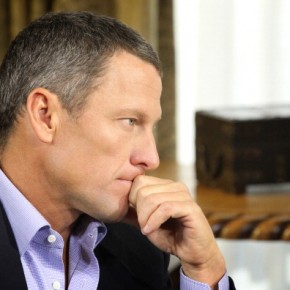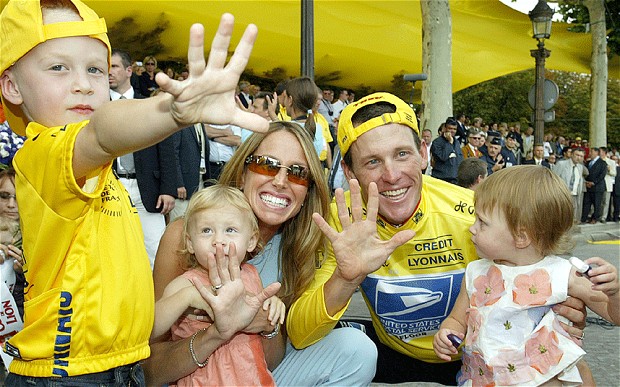
 I have been in mourning over the revelation of cyclist Lance Armstrong’s guilt for several months now since the preponderance of evidence seemed to point toward his having indeed doped (using banned performance enhancing substances) during his seven-year Tour de France reign. Of course, the man himself finally confirmed his guilt last week during a highly publicized two-part interview/confession with Oprah Winfrey. Now I find myself at a new place with the story since I am finally viewing Armstrong (and the many other cyclists allegedly guilty of doping) through a theological lens. In fact, I found Armstrong’s confession to be profoundly illustrative of what we at Mockingbird are so often trying to say about human nature.
I have been in mourning over the revelation of cyclist Lance Armstrong’s guilt for several months now since the preponderance of evidence seemed to point toward his having indeed doped (using banned performance enhancing substances) during his seven-year Tour de France reign. Of course, the man himself finally confirmed his guilt last week during a highly publicized two-part interview/confession with Oprah Winfrey. Now I find myself at a new place with the story since I am finally viewing Armstrong (and the many other cyclists allegedly guilty of doping) through a theological lens. In fact, I found Armstrong’s confession to be profoundly illustrative of what we at Mockingbird are so often trying to say about human nature.
Just by way of background, I have been an amateur cyclist and a professional cycling fan ever since Armstrong first won the Tour. Indeed, Armstrong seemed to re-inaugurate an interest for me (and many Americans) in cycling that had waned for a decade since Greg LeMond’s dominance. The same summer Armstrong won his third Tour, I was on a cycling team, and some of my teammates jokingly called me “Lance” when I was being a showboat—a nickname I admittedly did not resent since it was a compliment at the same time as it was a jab. Armstrong even signed a copy of his book, It’s Not about the Bike, for me so I could sell it at a charity fundraising auction. But I will digress no further. I just want to point out that I have admired the man for a long time (until very recently!), and I myself defended his supposed innocence since I wanted to believe so badly that he was not guilty. In a word, my admiration of this athletic “idol” was not lined up with my theology. I am not alone though—I was in the company of many fans, Armstrong’s own children included.
Now to the interview. Many people, both in the media and otherwise, have been critical of Armstrong’s confession ever since it aired last week, either seeming to say that he was not contrite enough or that he did not seem to be telling the whole truth. Others just appear indifferent about it since they’re frankly burned out by the scandal. Meanwhile, I saw his confession as a very raw expression of the human condition—even this successful superhuman athletic success story is a wretch like you and me. Original sin appears to be evenly distributed after all! If you haven’t watched the interview in full, I commend it to you at least for anthropological purposes.
The most memorable moment of the interview for me was when Oprah asked Armstrong, founder of the LIVESTRONG Foundation, whether he was a humanitarian or a jerk. To this inquiry, he responded, “Jerk and humanitarian. I’d say I was both, and we saw both, and now we’re seeing certainly more of the jerk part.” There is no denying this duality. Armstrong not only called himself a jerk but also a “bully” and (pardon me) an “arrogant prick” during the interview, speaking of his multiple antagonistic reactions to doping allegations over the years. Yet at the very same time, the LIVESTRONG Foundation with its ubiquitous yellow bracelets has raised money to the tune of $500-million and much awareness for cancer research and treatment. Indeed, many cancer survivors consider him a hero off the bike. This dual nature of Armstrong is analogous to Martin Luther’s description of the Christian as being simul iustus et peccator, simultaneously justified and sinful.
Something else that stood out to me was that idea that Armstrong had been living a mythical life that was much too heavy of a burden for even him, a great endurance athlete:
Armstrong: This story was so perfect for so long. And I mean that, as I try to take myself out of the situation, and I look at it. You overcome the disease, you win the Tour de France seven times, you have a happy marriage, you have children. I mean, it’s just this mythic, perfect story, and it wasn’t true.
Oprah: And that wasn’t true?
Armstrong: And that wasn’t true, on a lot of levels.
Oprah: Was it hard to live up to that picture that was created?
Armstrong: Impossible. Certainly I’m a flawed character, as I well know, and I couldn’t do that.
This sort of myth seems to be a plague among professional athletes and celebrities that can so often lead to their demise. But what Armstrong is saying should at certain levels resonate with us everyday people. The thing is the mythic, perfect story is also a part of our duality, too. We try to self-justify: to ourselves, to others, and perhaps to God. But eventually we see the emperor is wearing no clothes; Adam and Eve are hiding their shame; and we need some new garments since we are flawed characters. Not only that, but the myth, the lie, the self-justification: We can’t live up to it. Its weight crushes us, and then like Lance we must confess.
Of course, as Armstrong said at least twice during the interview, he is not the most believable guy right now. But even if he was holding some details back and even if he wasn’t contrite enough (whatever that means), let’s admit that this was a confession. As Armstrong at one point explained, “I don’t want to accuse anybody else. I don’t want to necessarily talk about anybody else. I made my decisions. They are my mistake, and I am sitting here today to acknowledge that and to say I’m sorry for that.” Oprah herself stated on CBS This Morning that this was the most important interview of her career. I point this out to say, this very public confession has been and will be viewed around the world for a very long time, and Armstrong was aware of this. It is difficult to imagine being in his place: Confessing to one person is difficult, but imagine confessing to the masses around the world and in the history books!
The final tragedy though is that (if what I’ve read is correct) Armstrong is apparently a stranger to the lasting absolution that we find in the Christian faith. As much compassion as I have for the man, if this experience hasn’t opened him up to the hope of what it means to be justified by faith–the good news that those who are hidden in Christ, buried in his death and resurrection, are justified in God’s sight–one can only imagine what would. So while the duality of Lance Armstrong as simultaneously jerk and humanitarian is helpful for understanding the grace of God, it is not the same thing. Lance needs a substitute, just as much as the rest of us do. On the other hand, Armstrong’s total bottoming out at the present moment might be helpful in so far as it often takes such a rock-bottom experience for one to recognize their utter need for a savior. As a matter of fact, who knows, God could be taking away the titles and public admiration of a seven-time Tour de France winner out of love, in order to bring him to his knees and unburden him of his various idols (just like He does and is doing with you and me). I hope with all my heart that Armstrong has, or already has had, such a come-to-Jesus moment.
(Lance, if you’re reading this, call me, and we can talk about this. Seriously.)
Somewhere in the middle of the interview, he quoted his ex-wife Kristin, whom he called “spiritual,” as saying to him on a regular basis that “the truth will set you free.” Kristin’s words of wisdom came up again at the very end when Oprah asked Armstrong a final question of what the moral to his story might be. He gave a long-winded, confusing answer with no real moral. Then, Oprah oprahfied the whole interview with this pithy summary: “I hope the moral of the story is what Kristin said in 2009: the truth will set you free.” My gut wrenched when I heard Oprah co-opt what Jesus Christ said of himself for therapeutic purposes. What Jesus actually said in John 8:32 was believing in the truth about him leads to everlasting freedom from our guilt before God. Sure the good news of Armstrong’s truthful confession is that it may provide him temporal psychological relief, but the stuff of John’s gospel is the Good News.
There is so much more I could say about the two-hour-long interview, but this being the internet, I’m going to stop here because this is too long for a webpage already. Meanwhile, here is SNL‘s treatment of the Armstrong confession and some other bizarre stories last week—just be forewarned that there is some offensive language:

COMMENTS
3 responses to “The Duality of Lance Armstrong: Simul Jerk et Humanitarian”
Leave a Reply















Hi Matt, thanks for the great article.
More and more I believe that self-justification is at the root of just about all our sinful nature. I can’t think of a thing – not one thing – that doesn’t stem from that. What do you think?
That sounds pretty good to me, Jim E..
I think you guys are on to something.
I think Lance Armstrong managed to do an incredible thing, seeing as most people I know can’t even find a Bicycle when they are on dope.